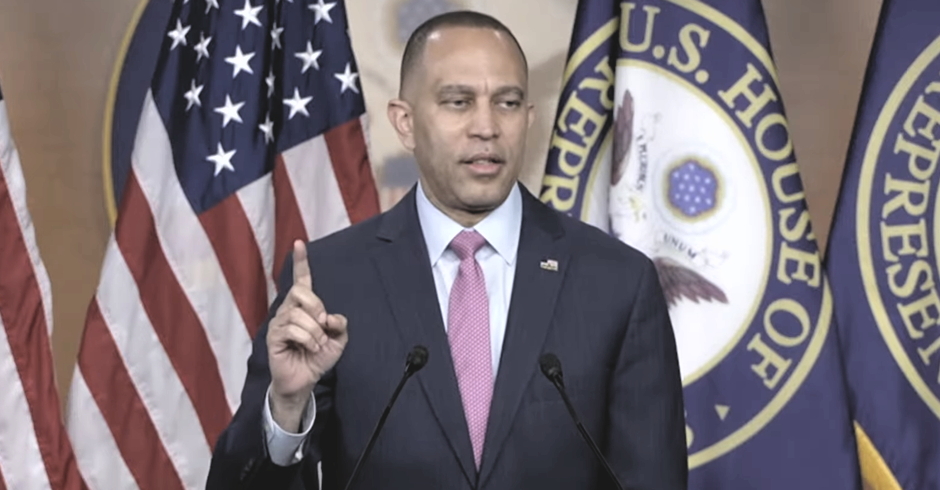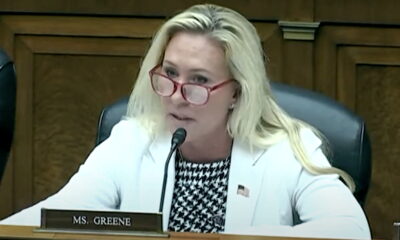News
On LGBT Job Discrimination, The Courts Are Finally Correcting Congress
Courts May Finally Prohibit Employment Discrimination On The Basis Of Sexual Orientation And Gender Identity
Â
The difficulty in passing a national bill protecting LGBT workers from employment discrimination highlights the dysfunction of American government. Despite the fact that a large majority of Americans supports such legislation, Republicans have steadfastly blocked proposed nondiscrimination laws through a variety of tactical maneuvers or poison pill amendments. However, the courts may finally do what Congress has been unwilling to do.
Currently, LGBT people are partially protected from employment discrimination by a patchwork of state and local laws, executive orders, and court rulings.
Although there is no federal law explicitly addressing employment discrimination based on sexual orientation and gender identity, executive orders–the first of which was issued in 1995 by President Bill Clinton–prohibit discrimination on the basis of sexual orientation and gender identity in federal employment and–thanks to President Obama–by government contractors.
While most “blue states†have passed nondiscrimination laws that cover sexual orientation and gender identity, most “red states†provide no state-wide protection for LGBT employees, though cities in many of them provide limited protection.
Courts have generally ruled on equal protection grounds that public employees are protected from discrimination on the basis of sexual orientation and gender identity, but have been reluctant to extend such protection to employees in the private sector absent state statutes or municipal ordinances.
While most large businesses have voluntarily adopted nondiscrimination policies that cover sexual orientation and gender identity, most small businesses in red states have not.
However, recent interpretations of Title VII of the Civil Rights Act of 1964 by the U.S. Equal Employment Opportunity Commission (EEOC), the federal agency charged with enforcing federal laws that make it illegal to discriminate against employees and job applicants, provide hope that LGBT individuals will soon enjoy protection against discrimination even in red states and even by private employers.
The EEOC has determined that Title VII prohibits discrimination on the basis of sexual orientation and gender identity. The determination is binding on all federal agencies and departments and governs EEOC enforcement and litigation activities throughout the country. Although courts are not bound by the EEOC’s interpretations, they often give deference to them.
The EEOC has recently announced that sexual orientation and gender identity is now a strategic enforcement priority for the agency. They are expected to mount an aggressive program of litigation on behalf of LGBT people who have experienced employment discrimination.
Gender Identity As a Protected Classification
Recent court rulings, at both the district and appellate levels, have affirmed that transgender people are protected from discrimination in employment.
For example, on December 6, 2011, the Eleventh Circuit Court of Appeals in Glenn v. Brumby upheld a lower court ruling that the Georgia General Assembly discriminated against Vandy Beth Glenn, a transgender woman who was fired from her job as Legislative Editor after she told her supervisor that she planned to transition from male to female.
In a forceful opinion authored by Judge Rosemary Barkett for a unanimous three-judge panel, which included one of the most conservative judges on the federal bench, Judge William Pryor, the Court declared, “An individual cannot be punished because of his or her perceived gender-nonconformity. Because these protections are afforded to everyone, they cannot be denied to a transgender individual. . . . A person is defined as transgender precisely because of the perception that his or her behavior transgresses gender stereotypes.”
The decision stated unequivocally: “We conclude that a government agent violates the Equal Protection Clause’s prohibition on sex-based discrimination when he or she fires a transgender or transsexual employee because of his or her gender non-conformity.”
The victory was the first ruling on transgender rights from the Eleventh Circuit, considered one of the most conservative circuits. The ruling brought the Eleventh Circuit in line with other circuits in applying to transgender individuals the U.S. Supreme Court ruling in Price Waterhouse v. Hopkins (1989) that said that gender non-conformity is included in the Civil Rights Act’s prohibition of discrimination on the basis of sex.
The plaintiff in the case, Vandy Beth Glenn, worked for two years in the Georgia General Assembly’s Office of Legislative Counsel as an editor and proofreader. In 2007, Glenn informed her immediate supervisor, Beth Yinger, that she planned to transition from male to female, and showed Yinger photographs of herself in professional female attire. Yinger passed the information on to her boss, the General Assembly’s Legislative Counsel, Sewell Brumby, who promptly fired her.
A 2012 ruling by the EEOC itself also held that gender identity discrimination is prohibited by Title VII of the Civil Rights Act of 1964. The decision was issued in Macy v. Holder, a case in which Mia Macy, a transgender woman who was denied employment with the Department of Alcohol, Tobacco, Firearms and Explosives (ATF) after she revealed her intention to transition from male to female, claimed that she suffered discrimination because of her gender identity.
Issued without dissent by the five-member, bipartisan Commission, the decision states unambiguously “that claims of discrimination based on transgender status, also referred to as claims of discrimination based on gender identity, are cognizable under Title VII’s sex discrimination prohibition.”
“When an employer discriminates against someone because the person is transgender, the employer has engaged in disparate treatment related to the sex of the victim. This is true regardless of whether an employer discriminates against an employee because the individual has expressed his or her gender in a non-stereotypical fashion, because the employer is uncomfortable with the fact that the person has transitioned or is in the process of transitioning from one gender to another, or because the employer simply does not like that the person is identifying as a transgender person.”
Masen Davis, then head of the Transgender Law Center (TLC), which brought the case on behalf of Mia Macy, described the decision as a “big leap forward,” because now “transgender people who feel they have faced employment discrimination can go into any of [the Commission’s] 53 offices and the EEOC will consider their claims. What’s more, the EEOC could take action itself to sue the employer for discrimination.”
He added, “Given that transgender people do not have employment protections in the vast majority of states, this creates a whole new fabric of legal support for our community.”
The TLC first pursued Macy’s complaint through the Office of Equal Opportunity of the ATF, which is responsible for considering complaints of discrimination by the agency. When the ATF’s equal opportunity officer denied that Title VII applied to transgender employees, the TLC filed suit, asking the EEOC to clarify the law.
https://www.youtube.com/watch?v=hMp0D4bAnokÂ
Sexual Orientation as a Protected Classification
Although it is now clear that Title VII’s prohibition of sex discrimination covers discrimination on the basis of gender stereotypes and gender identity, it is not yet firmly established that it also covers discrimination on the basis of sexual orientation.
At least two federal lawsuits are currently underway that may clarify the question.
One is Baldwin v. Foxx, a suit in which David Baldwin, a former Federal Aviation Administration employee, alleges that he was denied a promotion and suffered harassment based on his sexual orientation.  Baldwin first filed a complaint with the EEOC in 2012; finally, in July 2015, the EEOC ruled that sexual orientation is indeed covered by Title VII and permitted the lawsuit to go forward. It is currently pending in the U.S. District Court for the Southern District of Florida.
The uncertainty about whether sexual orientation is a protected classification was also recently confronted in an extraordinary ruling in the U.S. Court of Appeals for the Seventh Circuit issued on July 28, 2016 in a case known as Hively v. Ivy Tech. Judge Ilana Rovner, writing for a three-judge panel, called attention to the dilemma the court faced in considering the case of a lesbian, Kimberly Hively, who alleged that she had been discriminated against by Ivy Tech Community College in South Bend, Indiana.
Hively, who worked as a part-time adjunct professor for many years, claimed that she had repeatedly been passed over for full-time employment and promotions because of her sexual orientation. Her claim was dismissed by the district court in response to a motion by Ivy Tech, which claimed that Title VII does not ban discrimination on the basis of sexual orientation, a holding that the Seventh Circuit had made in other cases decided several years ago.
Feeling bound by Seventh Circuit precedent, the appellate panel affirmed the district court’s ruling, but Judge Rovner spent the great bulk of her opinion describing the changing legal landscape for LGBT people. She noted that the EEOC recently declared that “sexual orientation is inherently a ‘sex-based consideration,’ and an allegation of discrimination is necessarily an allegation of sex discrimination under Title VII.â€
She also observed that district and appellate courts have handled the question of whether Title VII prohibits sexual orientation discrimination very differently. Some have disallowed any claims where sexual orientation and gender non-conformity are intertwined, while others have tried to tease apart the sexual orientation and gender non-conformity claims and look only at those that appear to address gender-nonconformity, which the Supreme Court has held is protected under Title VII.
“Whether the line is nonexistent or merely exceedingly difficult to find, it is certainly true that the attempt to draw and observe a line between the two types of discrimination results in a jumble of inconsistent precedents,†she wrote.Â
Noting that since the EEOC ruling that sexual orientation discrimination is sex discrimination, many district courts, which she described as the “laboratories on which the Supreme Court relies to work through cutting-edge legal problems,†are beginning “to ask whether the sexual orientation-denying emperor of Title VII has no clothes.â€
Judge Rovner also pointed out that the U.S. Supreme Court rulings in Windsor, which struck down the Defense of Marriage Act in 2013, and in Obergefell, which in 2015 mandated that same-sex couples had a constitutional right to marry, created “a paradoxical legal landscape in which a person can be married on Saturday and then fired on Monday for just that act. For although federal law now guarantees anyone the right to marry another person of the same gender, Title VII, to the extent it does not reach sexual orientation discrimination, also allows employers to fire that employee for doing so.â€
She observed that “Discrimination against gay, lesbian, and bisexual employees comes about because their behavior is seen as failing to comply with the quintessential gender stereotype about what men and women ought to do—for example, that men should have romantic and sexual relationships only with women, and women should have romantic and sexual relationships only with men.†Thus, she implied, following the reasoning of Price Waterhouse, sexual orientation discrimination as well as gender identity discrimination should be prohibited.
She characterized the Seventh Circuit precedents that bound her as leading to “the absurd conclusion . . . that the law protects effeminate men from employment discrimination, but only if they are (or are believed to be) heterosexuals.â€
She added: “our [circuit’s] understanding of Title VII leaves us with a somewhat odd body of case law that protects a lesbian who faces discrimination because she fails to meet some superficial gender norms—wearing pants instead of dresses, having short hair, not wearing make up—but not a lesbian who meets cosmetic gender norms, but violates the most essential of gender stereotypes by marrying another woman.â€
The law, she concluded, “protects ‘flamboyant’ gay men and ‘butch’ lesbians but not the lesbian or gay employee who act or appear straight.â€
The unusual decision, which pointed out the absurdity of the current position in the Seventh Circuit, seemed to be begging for the plaintiff to ask for an en banc hearing to reconsider the case. Outdated precedents within a circuit can be overturned only by a Supreme Court ruling or by an en banc review by all the active judges within the circuit.
Â
In response, Lambda Legal, representing Kimberly Hively, quickly filed a request for an en banc review, which was promptly granted on October 6, 2016. Oral arguments in the case have been scheduled for November 30.Â
Inasmuch as en banc reviews are rarely granted, and seldom expedited as this case apparently has been, it seems likely that the Seventh Circuit will reverse the finding in favor of Ivy Tech and adopt the position of the EEOC that discrimination on the basis of sexual orientation is forbidden by Title VII of the Civil Rights Act.Â
If the Seventh Circuit does reverse, their decision will probably be appealed to the Supreme Court, which may accept it for review in order to render a final decision as to whether Title VII prohibits discrimination on the basis of sexual orientation.
Ian Milhiser, who has described Hively v. Ivy Tech as “the most important gay rights case since marriage equality was won,” has pointed out that if Hillary Clinton is elected president and appoints a liberal justice to replace the late Justice Antonin Scalia on the Supreme Court, SCOTUS will soon be the most liberal court in history. “That opens up the very real possibility that workplace discrimination on the basis of sexual orientation will be illegal throughout the entire nation.”
Â
Enjoy this piece?
… then let us make a small request. The New Civil Rights Movement depends on readers like you to meet our ongoing expenses and continue producing quality progressive journalism. Three Silicon Valley giants consume 70 percent of all online advertising dollars, so we need your help to continue doing what we do.
NCRM is independent. You won’t find mainstream media bias here. From unflinching coverage of religious extremism, to spotlighting efforts to roll back our rights, NCRM continues to speak truth to power. America needs independent voices like NCRM to be sure no one is forgotten.
Every reader contribution, whatever the amount, makes a tremendous difference. Help ensure NCRM remains independent long into the future. Support progressive journalism with a one-time contribution to NCRM, or click here to become a subscriber. Thank you. Click here to donate by check.
 |


















